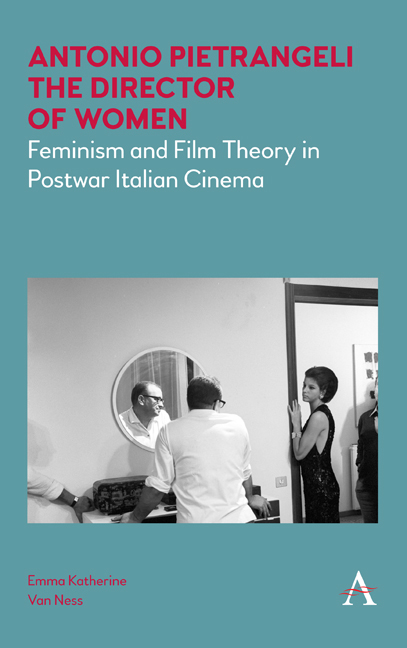Book contents
- Frontmatter
- Dedication
- Contents
- List of Illustrations
- Acknowledgments
- Vita
- Introduction: Antonio Pietrangeli, A Brief History
- Chapter 1 Pietrangelian Film Theory: From Neorealism to Feminism
- Chapter 2 Maid from the Margins: Il sole negli occhi
- Chapter 3 The Coming of Age of a Teenage Bride: Nata di marzo
- Chapter 4 Legally Bound: Political Realism and Prostitution in Adua e le compagne
- Chapter 5 Fantasmi a Roma: Sur-Realism and the Time-Image
- Chapter 6 The Dora Problem: La parmigiana, Piatti, Pietrangeli and Freud
- Chapter 7 Too Much Woman: Marriage, Power, and Excess in La visita
- Chapter 8 Breaking Faith: Il magnifico cornuto, Envy and the Crisis of Vision
- Chapter 9 Io la conoscevo bene … Or did I? Antonio Pietrangeli, the Author and the Actress
- Conclusion: Antonio Pietrangeli, Feminism and Film Theory
- Bibliography
- Index
Chapter 4 - Legally Bound: Political Realism and Prostitution in Adua e le compagne
Published online by Cambridge University Press: 06 May 2020
- Frontmatter
- Dedication
- Contents
- List of Illustrations
- Acknowledgments
- Vita
- Introduction: Antonio Pietrangeli, A Brief History
- Chapter 1 Pietrangelian Film Theory: From Neorealism to Feminism
- Chapter 2 Maid from the Margins: Il sole negli occhi
- Chapter 3 The Coming of Age of a Teenage Bride: Nata di marzo
- Chapter 4 Legally Bound: Political Realism and Prostitution in Adua e le compagne
- Chapter 5 Fantasmi a Roma: Sur-Realism and the Time-Image
- Chapter 6 The Dora Problem: La parmigiana, Piatti, Pietrangeli and Freud
- Chapter 7 Too Much Woman: Marriage, Power, and Excess in La visita
- Chapter 8 Breaking Faith: Il magnifico cornuto, Envy and the Crisis of Vision
- Chapter 9 Io la conoscevo bene … Or did I? Antonio Pietrangeli, the Author and the Actress
- Conclusion: Antonio Pietrangeli, Feminism and Film Theory
- Bibliography
- Index
Summary
Keeping Adua and Her Friends Down
The premise of Pietrangeli's Adua e le compagne (1960) seems simple enough at first glance, an overtly political departure from the director's examination of coupledom in his previous films. Four prostitutes, after the passing of the 1957 Merlin Law that closed Italy's state-regulated brothels, decide to open up a restaurant that will serve as a front for an independent bordello upstairs that will be run by the women themselves. Yet the difficulties that these women encounter, difficulties that run the gamut from the psychological to the physical to the legal and bureaucratic, all serve to illuminate the mechanisms of oppression still at work on these would-be former prostitutes. I will base my analysis of Pietrangeli's film on two thematic knots that tie the analyses of prostitution and male supremacy in the radical feminist writings of Dworkin, MacKinnon and Pateman to Pietrangeli's Adua e le compagne. The first theme is the issue of gender identity and prostitution. As Dworkin writes of the prostitute, “Who is she? She is no one. Not metaphorically no one. Literally, no one.” Pietrangeli reveals the inner workings of this identity problem, the prostitute's alienation from self, the feeling that she is no one, and its effect on the women, their social lives, their professional lives and their legal status. The second theme is related to identity but is rather the spatiotemporal consequences of the prostitute's lack of identity. Dworkin links prostitution to homelessness and the impossibility of a future. Not only is the prostitute denied a home, a space of her own, a safe haven, but she cannot even hope for a better future. According to Dworkin, “No woman who is prostituted can afford to be that stupid, such that she would actually believe that tomorrow will come.” Thrust out of the case chiuse, brothels or “closed houses,” Pietrangeli's four female protagonists, led by Adua, dare to hope for a better future and attempt to make a home of their own, but as Pietrangeli shows us, dreaming of a different profession and a different kind of home cannot be possible when, as Dworkin writes, “every hierarchy needs a bottom.”
- Type
- Chapter
- Information
- Antonio Pietrangeli, The Director of WomenFeminism and Film Theory in Postwar Italian Cinema, pp. 83 - 112Publisher: Anthem PressPrint publication year: 2020



